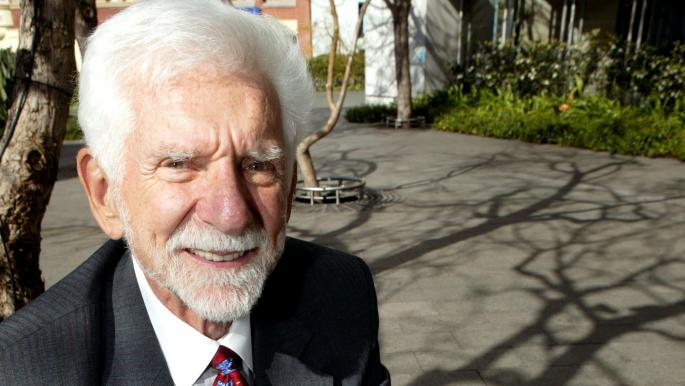Some of what the inventor of cell phones say 50 years ago: I see people who have lost their minds

Martin Cooper is the "father of mobile" (Getty)
The American engineer Martin Cooper, who invented the mobile phone fifty years ago, admits that these devices that he invented are now posing a problem, which is that people spend a lot of time using them.
"Abu al-Jawwal" says that the potential of mobile phones is unlimited, and can one day help in eradicating diseases, but he believes that people may have become somewhat addicted to them.
"It shocks me to see people crossing the street and looking at their mobile phones. They have lost their minds," the 94-year-old inventor told AFP in his office in Del Mar, California. "When people are run over by cars, they will understand," he jokes.
Wearing an internet-connected Apple Watch on his wrist, Cooper carries the latest iPhone, and he buys new phone models and dives in to test their capabilities. But he admits that the millions of apps available make one feel dizzy. "I will never be able to learn how to use a mobile phone the way my grandchildren and great-grandchildren do," he says.
actual kinetics
The cell phone that Martin Cooper carries and uses primarily to make calls has nothing to do with the heavy mass of wires and electronic circuits he used to make the first call from a mobile phone in history on April 3, 1973.
At that time, Cooper was heading a team of designers and engineers from Motorola, which invested millions of dollars to try to get ahead of the American giant Bell System, in designing the first mobile phone system.
Bell System referred to this idea at the end of World War II, but it only came to innovating phones for cars since the end of the sixties, given that their batteries were huge.
But this matter did not provide an actual movement in the eyes of Martin Cooper. After three months of continuous work, his team finally created the DynaTAC mobile phone.
He recalls that "the weight of this phone was more than a kilogram (...) and its battery allowed a conversation for 25 minutes." This "wasn't a problem", he says, as the device "was too heavy to carry for 25 minutes".
The first call Martin Cooper made from a mobile phone was to his rival at Bell System, Dr. Joel Engel.
He recounts: "I said to him, 'Joel, I'm Martin Cooper (...). I'm talking to you on a mobile phone. But it's a real mobile phone, personal, portable and hand-held'." "There was silence on the other end of the line," he says. "I think Joel Engel was gritting his teeth."
"We will defeat the disease"
These first cell phones were not cheap, as the price of one device was about five thousand dollars.
Real estate brokers were the first to adopt these phones, according to their inventor. The mobile phone enabled them to respond to new customers while they accompanied another customer to see a house. He notes that these devices contributed to "enhancing their productivity".
Martin Cooper notes that “today the mobile phone has become an extension of the person, and it can perform much more tasks,” and he expects this reality to be “just the beginning,” as the capabilities of the mobile phone are just beginning to be recognized.
"In the future, the mobile phone will revolutionize the fields of education and health," Cooper predicts. "I know I may sound like I'm exaggerating, but (...) within a generation or two we will defeat disease."
In the same way that his watch tracks his pulse when he swims, he says, phones will one day be connected to physical sensors that will detect illnesses before they happen.
The former engineer knew that cell phones would one day change the world, though he never imagined everything they could do.
"We knew that one day everyone would own a mobile phone," he says. "We are almost there."
As for the addiction of some to using their phones, this reality will change, according to Cooper. He predicts that "every generation will be smarter than the one before it, and people will learn to use smartphones more efficiently."
Human beings, in his view, "always make progress eventually, sooner or later".
Source : websites

